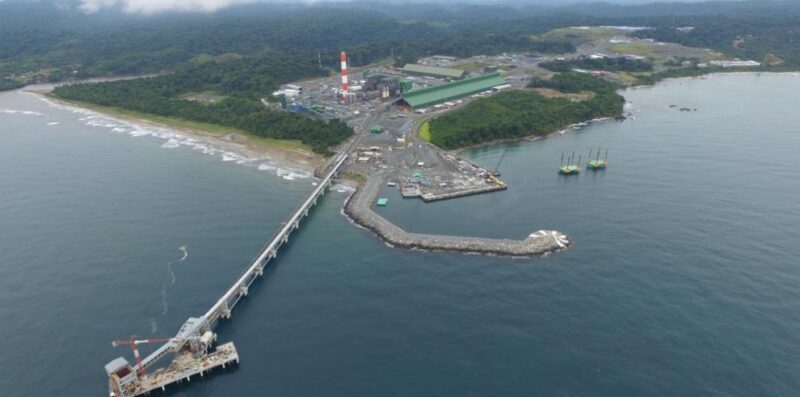Panama’s top court rules FQM contract unconstitutional
Panama’s Supreme Court ruled on Tuesday that First Quantum Minerals’ contract to operate its giant Cobre Panama copper mine, the only mining operation in the Central American country, is unconstitutional.
Challenges against the contract, which would have allowed Cobre Panama to keep operating for the next 20 years, piled up in court following public protests against the deal inked in October by the government and First Quantum’s local subsidiary, Minera Panama.
The court began deliberations on Friday and continued over the weekend. It announced a 12-hour break at the end of Monday’s session, delivering its verdict in in the early hours of Tuesday morning. The announcement was streamed live and watched by almost 24,000 people just in the first hour.
The court’s president Maria Eugenia Lopez said the vote against the contract had been unanimous, adding the ruling will now be published in the country’s official government newspaper.
First Quantum said in a statement that it was reviewing the ruling and that it “continues to reserve all its local and international legal rights in regards to developments in Panama.”
The Supreme Court decision adds to a growing list of questions surrounding First Quantum’s Cobre Panama mine and its implications.
Lawyers contacted by MINING.COM agree that the most immediate effect would be a freeze of First Quantum’s operations in the country. This doesn’t mean much though, they said, as Cobre Panama has been halted since Friday.
A previous contract was ruled illegal once before, in 2017, but the mine continued to operate as usual while both parties negotiated a new deal. Unprecedented public anger against the project this time may force the government to adopt a stricter approach, local sources said.
Multi-layer earthquake
The ruling will have consequences for the copper market, as Cobre Panama mine accounts for about 1.5% of global production of the metal.
It will also affect the government’s coffers. The mine accounts for about 5% of its GDP and makes up 75% of Panama’s export of goods, supporting at least 40,000 jobs, directly and indirectly.
It is also likely to lead to international arbitration. First Quantum on Sunday sent Panamanian authorities a notification of intent to start arbitration proceedings.
It later clarified the move was not the beginning of a legal procedure, but rather “a formality required by international treaties, with the purpose of opening a dialogue period of at least 90 days between the parties.”
“Pursuing international arbitration to recoup the massive financial loss of Cobre Panama would likely take years to resolve,” Orest Wowkodaw, analyst with Scotia Capital Inc. wrote in a note to clients. “However, we believe this course of action could ultimately bear fruit.”
Panama legislators had ratified the new contract between the executive and First Quantum, but reconsidered their decision after massive protests — the largest since a cost of living crisis last July — almost paralyzed the country.
Demonstrations against the contract have turned into an anti-government, end-to-all-mining movement. (Image: Screenshot of stock video.)
The land and sea ongoing demonstrations blocked the delivery of crucial supplies to the mine, forcing First Quantum to halt operations again this week.
The protests have also affected farmers, schools, emergency services and a long list of businesses unable to keep up activities due to lack of staff and supplies, stranded along the many blocked routes in and out the capital city.
Over the weekend, demonstrators received endorsements from climate activist Greta Thunberg and Hollywood actor Leonardo Di Caprio, who shared a video calling for the “mega mine” to cease operations.
Cobre Panama, in production since 2019, generated 112,734 tonnes of copper in the third quarter of 2023, contributing $930 million to First Quantum’s overall third-quarter revenue of $2.02 billion.
Analysts at BMO Capital Markets believe that First Quantum is in a financial position that allows it to weather the storm in the short term.
“Under our base-case scenario which assumes Cobre Panama mine closure through 2023 year-end, First Quantum has sufficient liquidity,” BMO analyst Jackie Przybylowski wrote.
Challenges, she added, would arise if Cobre Panama remained halted for 80 days in 2024, as this would draw First Quantum’s cash down to zero at the bank’s current commodity and cash outflow assumptions.
A closure for the first half of the year, beyond the May 2024 presidential election, would result in a $267 million cash shortfall, Przybylowski said. This estimation doesn’t including cash reserves required for working capital.
“The primary goal of the government and courts today appears to be calming the protests,” Przybylowski wrote on Tuesday. “We are optimistic that this approach will be successful, and that protests around the Cobre Panama port will subside, with mining operations likely to resume relatively quickly if protests are lifted.”
Shares in First Quantum were down 3% to A$9.07 in Toronto on the news Tuesday. Uncertainty around its flagship mine in Panama had already wiped about C$10 billion off First Quantum’s market value, almost 50% of it, since President Laurentino Cortizo decided to call a referendum on the contract. The popular vote was cancelled and the final decision was ultimately placed in hands of the Supreme Court.
Amid protests and the failed referendum, Panama legislators passed a bill that originally sought to revoke First Quantum’s contract, but ended up banning all future mining concessions, including exploration, extraction and transportation of minerals, as well as contract renewals in Panama.
SOURCE:mining.com
57 total views , 1 views today





